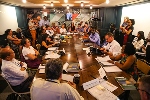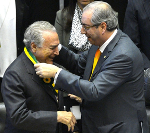Brazil
Published on Fri, 2020-10-16 11:55
Only a handful of political leaders decided to confront scientific advice, and one of these was President Jair Bolsonaro of Brazil, for whom COVID-19 was “just another little flu”. The result has been catastrophic, not just in terms of the pandemic (over 100,000 diagnosed deaths by mid-August 2020, second only to those in the USA) but also in terms of the economy that his denial policies tried to protect. In June, the World Bank forecast an 8 percent decline in Brazil’s GDP in 2020 (from a previous forecast of 2% growth), while the global economy is estimated to decline by 4.9 percent and emerging market and developing economies, including Brazil, by 3 percent, in their first contraction in at least 60 years. |
|
Brazil: The local fills the national policy vacuum
By the end of June 2020, Brazil was the developing country most affected by COVID-19 in terms of number of cases and of diagnosticzed deaths, second only to the US on both indicators.
The Brazilian federal government, under president Jair Bolsonaro has abandoned many of its SDG commitments. There is no transparency in several policy areas and the government channels for dissemination are out of date or down. In addition, DecreeNo.9.759/2019 extinguished and limits the creation of collegiate bodies in the federal government, and thus the National SDGs Council, created in 2016 ceased to exist.
There is an increase in opacity in the executive's performance and also a lack of political will to respond to the health crisis. However, within states and municipalities, local political leaders are taking the response to the pandemic seriously. This movement of governors, mayors and subnational legislators has produced results in the control of COVID-19, stirring the country's political board in an election year with good experiences of dialogue and participation in the localization of the 2030 Agenda.
|
Published on Mon, 2019-11-18 14:00
In Brazil the government of Captain Jair Bolsonaro does not make a secret of its disdain for policies and institutions aimed at supporting the people living in poverty. In its first day in office, on 1 January 2019, president Bolsonaro, dissolved the institutions responsible for the Zero Hunger policies (see Special Contribution 0.2 on the temporary extinction of CONSEA), an initiative that inspired anti-poverty policies around the world. The report by INESC documents the reduction, in the following weeks of policy spaces with civil society participation from 500 to 70. The affected monitoring bodies include the Council for Drug Policies, Council on the Rights of Persons with Disabilities, Council for the Eradication of Forced Labour, Commission for Biodiversity, and many more. Land-right defenders, trade unionist and NGO activists are being threatened and the Pastoral Commission on Land, a body of the Catholic Church, reported a dramatic increase in the first months of 2019 of murders related to land conflicts. |
Published on Fri, 2018-09-14 11:32
Austerity is a major concern in the report of Brazil. After over a decade of meaningful progress in tackling poverty through public investments in health, education and social protection, constitutional amendment 95/2016 (CA 95), known as the “Expenditure Rule”, came into force in 2017, freezing real public spending for 20 years. “By constitutionalizing austerity in this way”, comments the report by INESC, “any future elected governments will be prevented from democratically determining the size of human rights and basic needs investments.” Rule CA 95 has already begun to “disproportionately affect disadvantaged groups” as “significant resources are diverted from social programmes towards debt service payments”. These fiscal decisions “put at risk the basic social and economic rights of millions of Brazilians, including the rights to food, health and education, the implementation of the SDGs, while exacerbating gender, racial and economic inequalities”. |
Published on Mon, 2018-07-16 00:00
The experience of Voluntary National Reviews and of Civil Society shadow (or spotlight) reporting. The side event "SDG Implementation at National Level: What’s the Point of National Reports?" was held on July 17 in New York, during the meeting of the High Level Political Forum of the UN. The debate focused on voluntary national reports (VNRs) and parallel “shadow” or “spotlight” reports generated by civil society organizations (CSOs) on progress towards the Sustainable Development Goals (SDGs). |
|
Brazil made meaningful progress in tackling poverty from 2000 to 2013, largely with the aim of addressing the concentration of wealth and economic power. Most of this progress was a result of public investments in health, education, cash transfer programmes and social protection provision. Not coincidentally, the country’s economy thrived from burgeoning domestic demand. Brazil also set an example in its initial response to the 2008-2009 global economic crisis by increasing social investments,1 which in turn sustained the economy while promoting human rights.
|
Published on Mon, 2017-09-11 09:25
It will not be possible to implement the Sustainable Development Goals (SDGs) in Brazil. This sad prospect is a consequence of the lack of the necessary budgetary allocations, resulting from the current austerity policies of the Temer administration. Such policies establish a cap for social expenses and promote budgetary cuts of over 50 percent in many governmental bodies, along with other reforms that lead to social exclusion, increase inequalities and relinquish the national wealth via privatization processes. The current government of Brazil lacks legitimacy to promote actions and thus it uses the SDG discourse to justify its policies while at the same time rendering these same SDGs unattainable as a result of its political and economic decisions. |
|
Source: . Published on Wed, 2017-07-19 00:00
On the last official day of the UN High-Level Political Forum, civil society express concern that ‘vision without implementation is hallucination’. |
SUSCRIBE TO OUR NEWSLETTER







